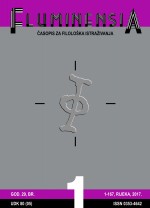THE EMPEROR HAS NO CLOTHES: DISINTEGRATION OF SLAMNIGS’S LYRIC SUBJECT
Keywords:
lyric subject, modern poetry, polyphonic theory of enunciation, performative, Ivan Slamnig, psychoanalysisAbstract
In this paper, the lyric subject of the Croatian poet Ivan Slamnig is analyzed with an underlining idea that his modernist poetics is characterized by disintegration of the enunciating self. This premise goes agianst the grain of dominant and/or more traditional approaches to Slamnig’s poetry, which have shared the assumption that the enounced of the poem has more value or authority in determining the meaning of the poem. This reductionist view has taken two distinct forms (albeit not different in kind): the lyric subject is either a human-like fictional speaker or a mask taken on by the author. Relying on the performative citational theory of Judith Butler and polyphonic theory of enunciation of Oswald Ducrot, the author demonstrates how the lyric subject is being subverted both on the levels of enunciation and the enounced. The enounced is always-already framed or produced by its enunciation. The split within the lyric subject itself, in most cases achieved by humor, reveals the purported anthropomorphic enunciating instance to be an effect of the poem, rather than the mask of its poet, or a single unique fictional character, or a secret codified speech on contextual reality. Psychoanalytic perspective of Alenka Zupančič is in this sense particularly instructive since it explains how humor breaks the illusion of wholeness and uniqness of the Symbolic order. By inserting an “odd-one” in the tradition of lyric subjects, i.e. a volatile subject with crazy-making or drunken behaviour, or an infantile observer and/or an invalidated speaking subject in any other way, shape or form – Slamnig demonstrated how this analytical category is being speech-produced, rather than speech-producing. The latter corresponds to Austin’s speech act theory main idea – that language is performative, rather than constative, which is crucial for understanding how Slamnig’s poetry performs within what has received from without.

